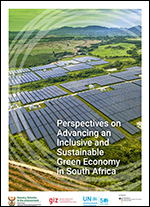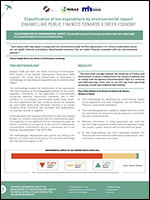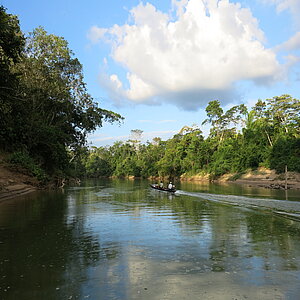Green Recovery: The Role of Fiscal Policies

A workshop series with experts and policymakers brought insights on the potential of green fiscal policy for a Green Recovery in the Asia-Pacific region.
In September 2021 during the run-up to the COP26 UN Climate Change Conference, leading experts from governments, international organizations, think tanks and academia came together to discuss the role of fiscal policies in the Green Covid-19 Recovery in Asia-Pacific. Over the course of five thematic sessions, participants discussed ways to align environmental, social and economic goals through fiscal policy. This online workshop is part of a series hosted by the Green Fiscal Policy Network (GFPN) in partnership with the UN Economic and Social Commission for Asia and the Pacific (UN ESCAP). The Green Fiscal Policy Network is supported by IKI´s Green Economy Transformation project.
In the opening ceremony, Kaveh Zahedi, Deputy Executive Secretary of ESCAP, set the stage by pointing towards the ‘window of opportunity’ the crisis has brought to align Covid recovery efforts with national climate mitigation and adaption aspirations. At the same time, he made clear that only a fraction of recovery spending in Asia-Pacific developing countries has had green characteristics, showcasing the need for countries to “radically change course to avoid locking in further inequality, vulnerability and environmental degradation”. He was joined by the Chief of UNEP’s Resources & Markets Branch, Steven Stone who used his welcoming words to emphasize the centrality of fiscal policy for a successful green recovery, describing it as “the hardwire of our economies”.
Of particular interest were the variety of in-depth insights into the implementation of various green fiscal policies by country representatives from the region. Jiyoung Choi, Director of Green Climate Policy Division of the Ministry of Economy and Finance, presented South Korea’s ambitious Green New Deal that aims to “support the structural transition of the overall economy and society”. Presenting the case of Kazakhstan, Aiman Yessikna shared insights into the progression of the emissions trading system, highlighting how the country was able to improve the carbon registry and transition to a benchmarking method that followed best international practice to effectively allocate allowances.
The current lack of progress on realizing a green recovery emphasizes the existence of significant barriers to green fiscal policies. The question of how we can overcome these barriers was at the heart of the final session.
Dudi Rulliadi, a senior policy analyst at the Ministry of Finance of the Republic of Indonesia, gave a presentation on the role of the ‘Coalition of Finance Ministers for Climate Action’ in fostering fiscal policies for a Green Recovery. He stressed that "access to green sustainable finance is the most important constraint to green recovery". In addition, he spoke in favour of the Commission's recommendation to implement green budgeting approaches.
Sandra Spies, Head of Section for Environmental Policy, Biodiversity and Forests at the GIZ, underlined the importance of political leadership, careful policy design, good communication, and inclusivity when implementing green fiscal policy to secure political buy-in.
Hamza Ali Malik, Director of Macroeconomic Policy and Financing for Development at ESCAP, rounded off the workshop by stressing the need for coalitions within civil society and effective stakeholder engagement – including with youth, and the poor – to facilitate consensus building and facilitate the continuation of green fiscal policies “fundamental” for an effective green recovery.
Looking to 2022 and beyond, UNEP and GIZ will continue to support the novel work led by the University of Oxford on tracking and assessing the alignment of the more than USD 16 trillion and growing in COVID-19 related spending announced till date. The existing work focused on COVID-19 related spending will be refined to add a job impact assessment and a greater focus on improving the precision of natural capital impact assessment. Expanding the coverage to monitoring national budgets by adapting the novel fiscal taxonomy developed for Global Recovery Observatory by the Oxford Smith School and UNEP, and using strengthened Adaptation and Resilience focus, will also be an important workstream that the Green Fiscal Policy Network will take on.
The regional technical workshops are an important channel for connecting global knowledge and stakeholders with regional and national policymakers and key actors.
The GFPN with the support of the IKI project Green Economy Tranformation will continue to deepen the engagement through a more programmatic approach to workshop organization, going deeper on the opportunities and challenges for using fiscal policy to green long-run socio-economic trajectories.
The next regional workshop will be conducted with UN ECLAC in Q1 2022.
The link has been copied to the clipboard
Contact
IKI Office
Zukunft – Umwelt – Gesellschaft (ZUG) gGmbH
Stresemannstraße 69-71
10963 Berlin














